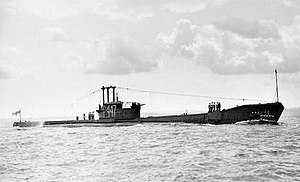HMS Astute (P447)
 HMS Astute (P447/S45)
| |
| History | |
|---|---|
| Name | HMS Astute |
| Builder | Vickers Armstrongs |
| Laid down | 4 April 1944 |
| Launched | 30 January 1945 |
| Commissioned | 30 June 1945 |
| Fate | Sold for scrap, 1 October 1970 |
| General characteristics | |
| Class and type | Amphion-class submarine |
| Displacement | 1,360/1,590 tons (surface/submerged) |
| Length | 293 ft 6 in (89.46 m) |
| Beam | 22 ft 4 in (6.81 m) |
| Draught | 18 ft 1 in (5.51 m) |
| Propulsion | 2 × 2,150 hp (1,600 kW) Admiralty ML 8-cylinder diesel engine, 2 × 625 hp (466 kW) electric motors for submergence driving two shafts |
| Speed |
|
| Range |
|
| Test depth | 350 ft (110 m) |
| Complement | 60 |
| Armament |
|
HMS Astute (P447) was an Amphion-class submarine. Her keel was laid down by Vickers at Barrow-in-Furness. She was launched in 1944 and commissioned in 1945.[1]
In 1953 she took part in the Fleet Review to celebrate the Coronation of Queen Elizabeth II.[2] Astute was scrapped on 1 October 1970 at Dunston on Tyne.
Design
[edit]Like all Amphion-class submarines, Astute had a displacement of 1,360 tonnes (1,500 short tons) when at the surface and 1,590 tonnes (1,750 short tons) while submerged. It had a total length of 293 feet 6 inches (89.46 m), a beam length of 22 feet 4 inches (6.81 m), and a draught length of 18 feet 1 inch (5.51 m). The submarine was powered by two Admiralty ML eight-cylinder diesel engines generating a power of 2,150 horsepower (1,600 kW) each. It also contained four electric motors each producing 625 horsepower (466 kW) that drove two shafts.[3] It could carry a maximum of 219 tonnes (241 short tons) of diesel fuel, although it usually carried between 159 and 165 tonnes (175 and 182 short tons).[3]
The submarine had a maximum surface speed of 18.5 knots (34.3 km/h; 21.3 mph) and a submerged speed of 8 knots (15 km/h; 9.2 mph).[4] When submerged, it could operate at 3 knots (5.6 km/h; 3.5 mph) for 90 nautical miles (170 km; 100 mi) or at 8 knots (15 km/h; 9.2 mph) for 16 nautical miles (30 km; 18 mi). When surfaced, it was able to travel 15,200 nautical miles (28,200 km; 17,500 mi) at 10 knots (19 km/h; 12 mph) or 10,500 nautical miles (19,400 km; 12,100 mi) at 11 knots (20 km/h; 13 mph).[3] Astute was fitted with ten 21-inch (533 mm) torpedo tubes, one QF 4-inch naval gun Mk XXIII, one Oerlikon 20 mm cannon, and a .303 British Vickers machine gun. Its torpedo tubes were fitted to the bow and stern, and it could carry twenty torpedoes. Its complement was sixty-one crew members.[3]
Astute was laid down at Vickers-Armstrongs Barrow-in-Furness shipyard on 4 April 1944, was launched on 30 January 1945 and completed on 30 June 1945.[5]
Service history
[edit]Astute arrived at Halifax, Nova Scotia on 11 April 1950 for a six-week training period with the Royal Canadian Navy ending on 1 July.[6] Astute spent 21 months in 1955–56 based at Halifax as part of the Canadian submarine squadron, leaving Canada for the UK on 10 December 1956.[7]
As a response to the Cuban Missile Crisis, Astute and sister ship Alderney, both part of the Halifax-based 6th Submarine Squadron, were deployed to the North-East of the Grand Banks to warn if Soviet submarines were to be sent across the Atlantic to Cuba.[8]
References
[edit]- ^ "HMS Astute (P 447)". uboat.net.
- ^ Souvenir Programme, Coronation Review of the Fleet, Spithead, 15th June 1953, HMSO, Gale and Polden
- ^ a b c d Paul Akermann (1 November 2002). Encyclopedia of British Submarines 1901–1955. Periscope Publishing Ltd. p. 422. ISBN 978-1-904381-05-1.
- ^ "Acheron class". World Naval Ships, Cranston Fine Arts. Retrieved 20 August 2015.
- ^ Blackman 1962, p. 275.
- ^ "Submarine Arrives". The Crowsnest. Vol. 2, no. 7. King's Printer. May 1950. p. 4.
- ^ "Command News: H.M.S. Ambrose". Navy News. February 1957. p. 9. Retrieved 9 September 2018.
- ^ Hennessy & Jinks 2016, pp. 275–277
Publications
[edit]- Blackman, V.B. (1962). Jane's Fighting Ships 1962–63. London: Sampson Low, Marston & Co. Ltd. OCLC 181864290.
- Colledge, J. J.; Warlow, Ben (2006) [1969]. Ships of the Royal Navy: The Complete Record of all Fighting Ships of the Royal Navy (Rev. ed.). London: Chatham Publishing. ISBN 978-1-86176-281-8.
- Hennessy, Peter; Jinks, James (2016). The Silent Deep: The Royal Navy Submarine Service since 1945. Penguin. ISBN 978-0-241-95948-0.
